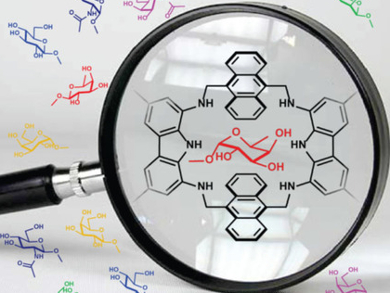One of the main challenges of supramolecular chemistry is the development of biomimetic receptors which can effectively recognize specific carbohydrates in water. Such receptors mimic the function of lectins, highly specific carbohydrate-binding proteins. While significant advances were made in the recognition of glucose, there has been little success with other sugars. Some of these sugars are essential mediators of a wide range of both physiological and pathological processes.
Oscar Francesconi and colleagues, University of Florence, Italy, have developed a synthetic receptor (pictured in black) that shows a remarkable affinity for the sugar fucose (pictured in red) in water, closely comparable to that of lectins. The team combined diaminocarbazole and anthracene units in an appropriately sized macrocyclic architecture. The artificial receptor was easily prepared on a multi-gram scale in six steps with 30 % overall yield.
Binding studies carried out using NMR spectroscopy and isothermal titration calorimetry (ITC) showed that the fucose recognition is driven by the formation of an extended hydrogen-bonding network. According to the researchers, their synthetic receptor could be a new tool in glycobiology as an alternative to natural lectins with potential therapeutic applications.
- A Biomimetic Synthetic Receptor Selectively Recognising Fucose in Water,
Oscar Francesconi, Marco Martinucci, Lorenzo Badii, Cristina Nativi, Stefano Roelens,
Chem. Eur. J. 2018, 24, 6828–6836.
https://doi.org/10.1002/chem.201800390


